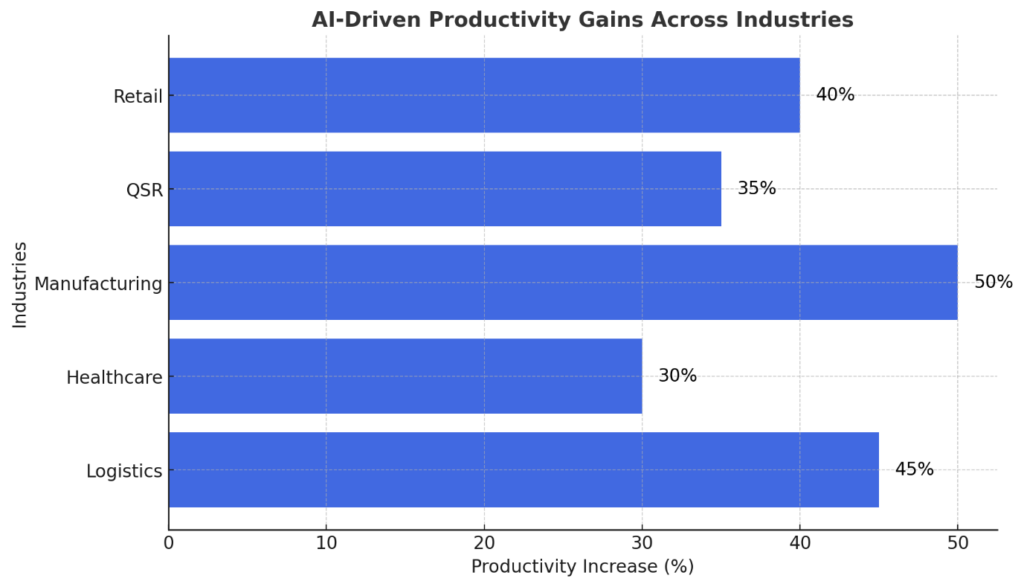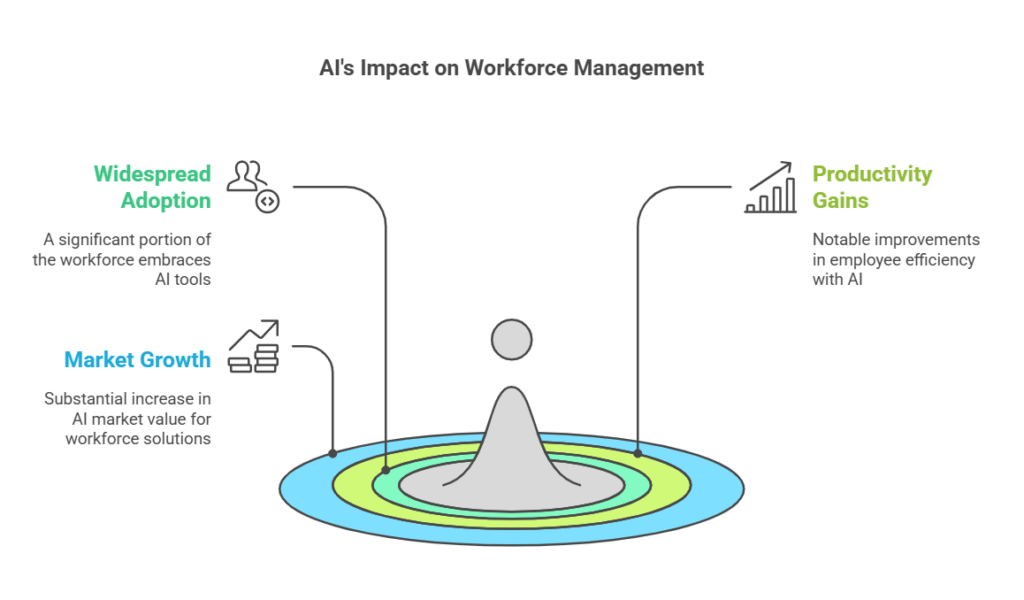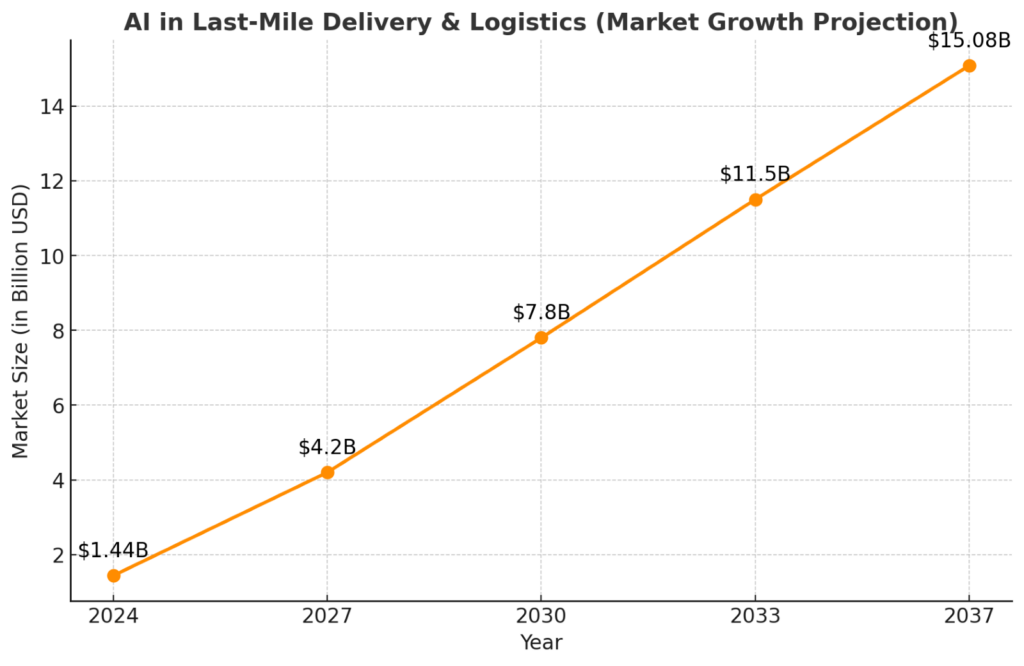 07 February,2025
07 February,2025
10 AI-Driven Trends Reshaping Business & Operations in 2025
Artificial Intelligence (AI) is no longer a distant promise of the future—it is the defining force behind business transformation today. Across industries, AI-driven innovations are unlocking unprecedented levels of efficiency, precision, and scalability, enabling businesses to outperform competitors, optimize workflows, and elevate customer experiences.
As companies adapt to a fast-evolving digital economy, AI is proving to be more than just an operational tool—it is a strategic enabler of success. From intelligent automation that eliminates redundancies to predictive analytics that anticipate demand shifts, AI is rapidly becoming the cornerstone of modern business decision-making.
Why Now?
With AI adoption surging and its capabilities expanding, 2025 is poised to be a landmark year where businesses that leverage AI will gain a significant competitive advantage. Those who fail to integrate AI-driven efficiencies risk falling behind in an increasingly data-driven world.
This article explores 10 AI-powered trends that are reshaping industries in 2025, offering businesses a roadmap to harness AI for sustainable growth, improved efficiency, and smarter decision-making. Whether you’re in retail, QSR, logistics, or technology, understanding these trends will be key to future-proofing your business in an AI-first era.
1. AI-Powered Automation is Streamlining Operations
AI-driven automation is no longer just about eliminating repetitive tasks—it is about creating smarter, self-improving systems that enhance efficiency, reduce costs, and optimize workflows in real-time. From intelligent process automation (IPA) in enterprises to AI-powered robotics in supply chains, automation is becoming the backbone of modern operations.
Industry Impact:
- AI-powered automation increases productivity by up to 40%, allowing businesses to reallocate resources to higher-value tasks.
- AI-driven scheduling reduces labour costs by 20%, ensuring optimal staffing levels in industries like retail and QSR.)
- Predictive AI analytics in supply chains have reduced stock shortages by 35%, ensuring seamless product availability.

What This Means for You:
Businesses must integrate AI-driven scheduling, supply chain automation, and predictive maintenance to boost productivity and stay competitive in a rapidly evolving landscape. AI automation isn’t just about cost savings—it’s about creating agile, intelligent operations that drive long-term success.
2. Data-Driven Decision-Making is No Longer Optional
In today’s data-rich environment, leveraging AI-powered analytics is essential for businesses aiming to make accurate, real-time decisions. By harnessing AI, organizations can transform vast amounts of data into actionable insights, leading to improved forecasting, personalized customer interactions, and enhanced operational efficiency.
Key Insights:
- Enhanced Decision Accuracy: Businesses utilizing AI data analytics have boosted their decision-making accuracy by up to 30%.
- Revenue Growth in Retail: 69% of retailers have reported an increase in their annual revenue as a result of adopting AI.
What This Means for You:
To remain competitive, organizations must integrate real-time AI analytics into their operations. This integration facilitates better forecasting, enables personalized customer interactions, and drives significant operational improvements. By embracing AI-driven data analysis, businesses can navigate complex market dynamics with agility and precision.
3. AI is Driving Personalization & Customer Engagement
In today’s competitive market, consumers expect personalized experiences tailored to their preferences. Artificial Intelligence (AI) enables businesses to deliver these hyper-personalized interactions at scale, significantly enhancing customer engagement and loyalty.
Market Trends:
- Widespread Adoption: A significant majority of businesses, 92%, are now utilizing AI-driven personalization strategies to foster business growth.
- Enhanced Customer Engagement: Companies implementing AI-powered personalization have observed a 40% increase in revenue, highlighting the effectiveness of tailored customer experiences.
- Improved Conversion Rates: Websites that have integrated AI chatbots have experienced a 23% boost in conversion rates, underscoring the role of AI in guiding customer decisions.
What This Means for You:
To meet evolving consumer expectations and stay competitive, businesses should integrate AI-driven tools such as recommendation engines, personalized loyalty programs, and dynamic pricing models. These technologies not only enhance customer satisfaction but also drive increased revenue by delivering experiences that resonate with individual customers.
4. AI and Robotics are Transforming Physical Workspaces
Artificial Intelligence (AI) and robotics are revolutionizing physical workspaces, enhancing efficiency, accuracy, and cost-effectiveness across various industries. From automated inventory management to robotic process automation (RPA), businesses are becoming faster, more agile, and more competitive.
Real-World Use Cases:
- Enhanced Picking Accuracy: Warehouses implementing AI-driven robotics have achieved significant improvements in picking accuracy. For instance, Amazon’s deployment of AI-powered robots in their fulfillment centers has led to substantial enhancements in order accuracy and efficiency.
- Labor Cost Reduction in QSRs: Quick Service Restaurants (QSRs) adopting robotic automation have reported notable reductions in manual labor costs. For example, Chipotle’s introduction of the “Autocado” robot for avocado preparation aims to streamline operations and reduce labour expenses.
What This Means for You:
To remain competitive, businesses should explore integrating AI-driven solutions such as automated inventory management, predictive maintenance, and robotic process automation. These technologies can significantly reduce errors, lower operational costs, and enable efficient scaling. Embracing AI and robotics not only enhances current operations but also positions businesses to adapt swiftly to future technological advancements.
5. AI is Enhancing Workforce Management & Employee Productivity
Artificial Intelligence (AI) is transforming workforce management by optimizing scheduling, enhancing training programs, and providing data-driven insights to boost employee productivity. By leveraging AI, businesses can streamline operations, reduce inefficiencies, and foster a more engaged workforce.

Industry Impact:
- Widespread Adoption: In 2024, 75% of surveyed workers reported using AI in their workplace tasks, with nearly half (46%) having adopted these tools within the last six months.
- Productivity Gains: Employees utilizing AI tools have experienced significant productivity improvements. For instance, a study found that workers using AI-powered conversational assistants increased their productivity by 14%, with the most substantial gains observed among less experienced employees.
- Market Growth: The AI in workforce management market is projected to grow from USD 1.9 billion in 2023 to USD 14.2 billion by 2033, reflecting a compound annual growth rate (CAGR) of 22.3%.
What This Means for You:
To capitalize on these advancements, businesses should integrate AI-driven human resources software, intelligent scheduling tools, and productivity analytics into their operations. These technologies can help optimize workforce management, enhance employee engagement, and drive overall organizational efficiency. By embracing AI, companies can stay competitive in a rapidly evolving business landscape.
Power Your Franchise with AI & StoreFlow
Seamless operations, smarter decisions, and effortless scaling—all in one platform.
Book a Demo6. AI-Powered Supply Chains Are Reducing Costs & Risks
Artificial Intelligence (AI) is transforming supply chain management by providing real-time insights, predictive forecasting, and automated logistics optimization. These advancements lead to significant cost reductions and risk mitigation across various industries.
Market Trends:
- Inventory Optimization: Early adopters of AI-enabled supply chain management have reduced inventory levels by 35%, minimizing holding costs and stockouts.
- Logistics Cost Reduction: Companies implementing AI in their supply chains have decreased logistics costs by 15% through enhanced route planning and demand forecasting.
- Market Growth: The AI in supply chain market is projected to grow from USD 4.5 billion in 2023 to approximately USD 157.6 billion by 2033, reflecting a compound annual growth rate (CAGR) of 42.7%.
What This Means for You:
To maximize efficiency and minimize risk, organizations should integrate AI-powered inventory management systems, route optimization tools, and demand forecasting solutions. Embracing these technologies can lead to substantial cost savings, improved operational performance, and a more resilient supply chain capable of adapting to dynamic market conditions.
7. AI-Driven Fraud Detection is Strengthening Cybersecurity
As cyber threats become increasingly sophisticated, businesses are turning to Artificial Intelligence (AI) to enhance their fraud detection and cybersecurity measures. AI’s ability to analyze vast amounts of data in real-time allows for the identification of anomalous patterns indicative of fraudulent activities, thereby bolstering organizational defences.
Industry Impact:
- Widespread Adoption: A significant majority of organizations, approximately 73%, have integrated AI into their fraud detection systems, leveraging its capabilities to identify and prevent fraudulent activities more effectively.
- Enhanced Detection Accuracy: AI systems have been shown to improve fraud detection accuracy by more than 50% compared to traditional methods, enabling businesses to more effectively identify and mitigate fraudulent activities.
- Market Growth: The global market for AI-based cybersecurity products was valued at approximately $15 billion in 2021 and is projected to surge to roughly $135 billion by 2030, reflecting the increasing reliance on AI to combat cyber threats.
What This Means for You:
To safeguard customer data and maintain operational integrity, businesses should implement AI-based fraud detection systems, biometric authentication methods, and AI-driven security monitoring tools. These technologies not only enhance the accuracy and efficiency of threat detection but also provide proactive defences against evolving cyber threats. By embracing AI-driven cybersecurity measures, organizations can significantly reduce the risk of data breaches and fraudulent activities, ensuring a more secure environment for their operations and customers.
8. AI is Revolutionizing Last-Mile Delivery & Logistics
Artificial Intelligence (AI) is transforming last-mile delivery and logistics by optimizing routes, reducing costs, and enhancing overall efficiency. These advancements are crucial as the demand for faster and more reliable deliveries continues to grow.
Real-World Examples:
- Route Optimization and Cost Reduction: Companies implementing AI-driven route optimization have achieved significant cost savings. For instance, AI helps create actionable scores that identify 2% of addresses that drive more than 30% of shipping losses, enabling more efficient delivery decisions.
- Market Growth: The AI-enabled last-mile delivery market is experiencing rapid expansion. Valued at over USD 1.44 billion in 2024, it is projected to reach USD 15.08 billion by 2037, growing at a compound annual growth rate (CAGR) of approximately 19.8%.

What This Means for You:
Retailers and logistics companies should invest in AI-driven route planning, automated delivery tracking, and fleet optimization to enhance customer satisfaction and reduce operational costs. By leveraging AI, businesses can streamline their delivery processes, anticipate potential issues, and respond swiftly to changing conditions, ensuring timely and efficient service.
9. AI-Powered Dynamic Pricing is Boosting Profits
Artificial Intelligence (AI) enables businesses to implement dynamic pricing strategies, adjusting prices in real-time based on consumer demand, competitor pricing, and various external factors. This approach enhances profitability and ensures competitiveness in fluctuating markets.
Industry Impact:
- Revenue Increase: Companies utilizing AI-driven dynamic pricing have reported revenue increases ranging from 5% to 20%.
- Profit Margin Improvement: Retailers employing AI-based pricing strategies have achieved higher profit margins without negatively impacting sales volume.
What This Means for You:
To maximize profits and maintain a competitive edge, businesses should explore AI-powered pricing optimization tools. These tools analyze market trends, consumer behaviour, and competitor actions to set optimal prices, leading to increased revenue and improved inventory turnover. Implementing AI-driven dynamic pricing strategies allows companies to respond swiftly to market changes, ensuring they remain competitive while maximizing profitability.
10. AI-Driven Efficiency for Franchise Growth
AI isn’t just a game-changer for global enterprises—it’s transforming how franchise businesses scale, operate, and thrive in competitive markets. From real-time analytics to automated workflows, AI enables multi-location businesses to streamline operations, reduce costs, and optimize performance without complexity.
How AI is Fuelling Franchise Success:
- Intelligent Operations Management: AI-powered insights provide real-time performance tracking, helping franchise owners identify revenue opportunities and optimize resources.
- Seamless Inventory & Supply Chain Automation: AI-driven inventory tracking eliminates stockouts and inefficiencies, ensuring frictionless stock replenishment across multiple locations.
- Scalable Expansion Strategies: AI-powered forecasting and data-driven decision-making allow franchises to expand faster and more cost-effectively, without compromising efficiency.
How StoreFlow Helps:
At StoreFlow, we understand the challenges of scaling and managing franchise operations. Our AI-driven platform simplifies:
✔ Seamless Multi-Location Management: Oversee every franchise location from a unified dashboard, ensuring consistency and control across your entire network.
✔ Enhanced Team Collaboration: Facilitate real-time updates, task assignments, and seamless communication to keep your team connected and efficient.
✔ Real-Time Insights and Analytics: Access essential metrics instantly, enabling data-driven decisions that fuel growth and operational excellence.
✔ Effortless Compliance and Quality Control: Utilize built-in visit scheduling, custom checklists, and task reminders to ensure every store meets your brand’s standards.
Want to build a smarter, more efficient franchise business? Discover how StoreFlow can help.

 Share
Share
